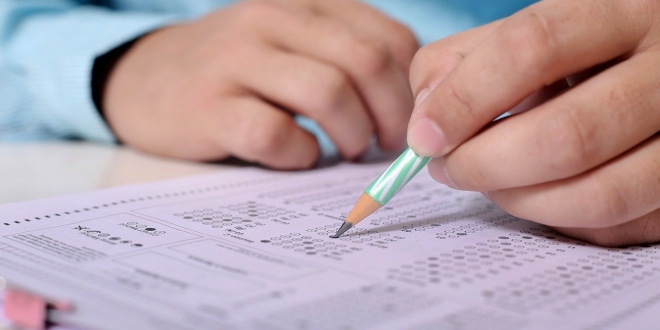The education secretary, Gavin Williamson, has confirmed next year’s scheduled GCSE and A-Level exams will go ahead, but with a three-week delay.
Next year’s exams will go ahead in England, but most will be subject to a three-week delay to allow for additional teaching time, the government has confirmed.
Gavin Williamson, the education secretary, confirmed that GCSE’s and A-Levels would be held next summer with small adjustments to the curriculum already outlined by the qualifications regulator, Ofqual.
Mr Williamson said it was the fairest thing to do for students who have already faced severe disruption to their studies, but teaching and education unions have dismissed the move as “inadequate” and “cruel”, claiming that contingency planning for any further disruption in schools and colleges was being left too late.
Geoff Barton, the general secretary of the Association of School and College Leaders, said: “We are dismayed by this announcement.
“It has taken the government an eternity to reach a very inadequate response to the scale of the challenge which lies ahead for students who are taking GCSEs and A-levels next year.
“Delaying the start of exams by three weeks is of marginal benefit when compared with the loss of learning from the national lockdown and ongoing disruption.”
Dr Mary Bousted, the joint general secretary of the National Education Union, joined the criticism of the government’s plan, saying: “This is just cruel. Today’s announcement amounts to a dereliction of duty by government to pupils, parents and education professionals.”
Headteachers have already been calling for pupils to be given more topic choice for exams, as a way to limit the impact of them not being able to cover all of the curriculum. They have also suggested that students should sit fewer exams in each subject.
However, government sources have suggested recently that the government is insistent that there should be no “dumbing down” of exams next year.
The summer exams for almost all AS/A-levels and GCSEs are scheduled to start on 7 June 2021 and run until 2 July 2021. As part of the new plans, results for both GCSEs and A/AS-Levels will be held in the same week for the first time. With A and AS Level results announced on 24 August and GCSE results coming out on 27 August.
In a written ministerial statement, Gavin Williamson said: “Fairness to pupils is my priority, and will continue to be at the forefront of every decision we take in the lead up to exams next summer.
“Exams are the fairest way of judging a student’s performance so they will go ahead, underpinned by contingency measures developed in partnership with the sector.
“Students have experienced considerable disruption and it’s right we give them, and their teachers, the certainty that exams will go ahead and more time to prepare.
“Combined with our £1bn catch-up programme and the changes proposed by Ofqual to free up teaching time, the changes I am announcing today give young people the best chance of being ready for their exams without undermining the value of the qualifications they receive.”
Despite the plans to delay the exams, there is some concern that the government is not doing enough to plan ahead and make contingencies for any further disruption that may be caused due to future lockdowns. Dr Patrick Roach, the general secretary of the NASUWT teachers’ union, said: “We cannot risk a repeat of the chaos which engulfed this year’s exam results and it is imperative that a range of robust and transparent contingency measures are developed.”
It is feared that pupils in the north of England are at a particular disadvantage due to the government’s plan to press ahead with exams, given the higher rates of infection in the north,
Sarah Mulholland, head of policy at the Northern Powerhouse Partnership said: “We’re very concerned that young people across the North are likely to be at a disadvantage if the Department for Education opts to go ahead with GCSE and A-Level exams next summer, given the fact that they are the ones most likely to have been impacted by school closures following year group bubbles of pupils having to be sent home for instance.
“Continuous assessment would be a much fairer alternative to the proposed plan, and would reduce the risk of a similar fiasco such as we saw this summer.”






Facebook Comments